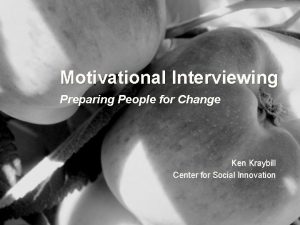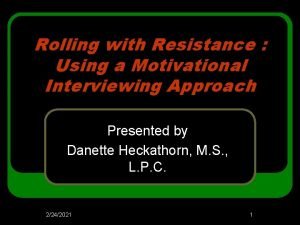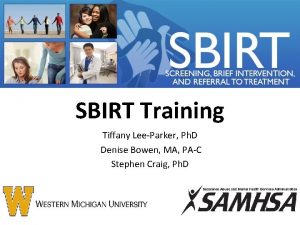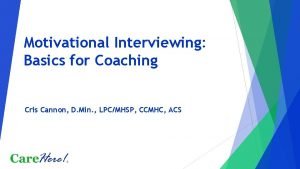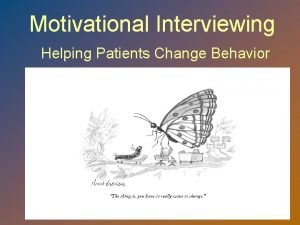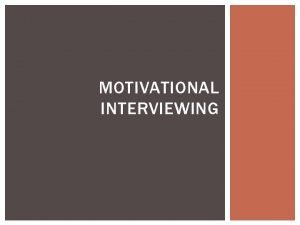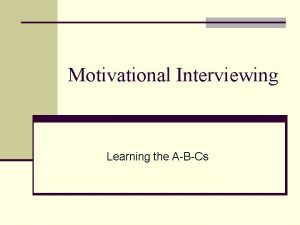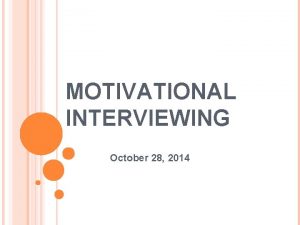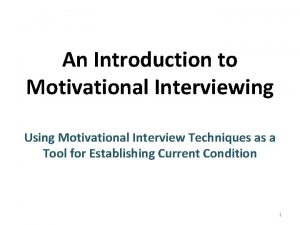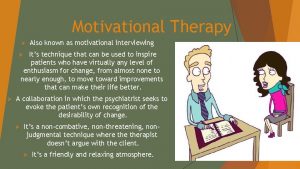Motivational Interviewing in Healthcare Settings Change Talk WarmUp
















- Slides: 16

Motivational Interviewing in Healthcare Settings: Change Talk

Warm-Up Exercise 1: Sustained Reflective Listening Break into pairs Participants in each pair decide who will be the first patient. Each patient will discuss “Something I’m considering changing is…” The provider's task is to respond only with reflectivelistening statements. The speaker responds to reflection by continuing to elaborate. Stay in role, not discussing or breaking role until I tell you to stop

Change Talk Focus on change talk is a unique element of MI Speech from a patient that favors change • I need to get my anxiety under control • I want to be able to go to my son’s baseball game Central goal: • Help clients articulate their reasons for changing • In doing so – strengthening their intention to change

Change Talk A key focus of MI – Desire – Ability – Reasons – Need – Commitment – Activating – Taking Steps Preparatory Change Talk Predicts Commitment Language Mobilizing Change Talk Predicts Behavior Change

Practice Exercise 2: Drumming for Change Talk I’m going to read a list of things a patient might say during a conversation about improved glycemic control The component behaviors of glycemic control for this patient are: diet, exercise, medication, monitoring, and stress management Whenever you hear a statement that is change talk, drum on the table

Change Talk in MI Continued It has to be the client who utters change talk – Provider questions can make these utterances more or less likely When you hear change talk…do something about it! – Reflect it – Ask for elaboration – “In what ways? ” “What else? ” “Tell me more” – Collect it into a “bouquet”

Questions to Elicit Change Talk Desire? – Why do you want to make this change? Ability? – If you did decide to make this change how would you do it? Reasons? – What are the 3 most important benefits you see in making this change? Need? – How important is it to you to make this change?

Questions to Elicit Change Talk Commitment – What do you think you will do? Activating/Taking Steps – What are you already doing to be healthy?

Questions to Elicit Sustain Talk (What we don’t want) Why don’t you want to? Why can’t you? Why haven’t you? Why do you need to (e. g. smoke)? Why don’t you?

Using a Ruler How important is it for you to_____? On a scale of 1 -10 how where 1 is not at all and 10 is very much, how important is it for you to? And why is it a 5 and not a 3? How confident are you that you can_____? On a scale of 1 -10 how where 1 is not at all and 10 is very much, how confident are you? And why is it a 5 and not a 3?

Questions to Elicit Sustain Talk (What we don’t walk) How important is it for you to_____? On a scale of 1 -10 how where 1 is not at all and 10 is very much, how important is it for you to? And why is it a 5 and not a 7? How confident are you that you can_____? On a scale of 1 -10 how where 1 is not at all and 10 is very much, how confident are you? And why is it a 5 and not a 7?

Pros and Cons First ask about the good things about the status quo Then ask about the not so good things “What do you like about sweet tea? ” “What are the concerns you have about drinking sweet tea” Then summarize the answer and ask a key question, if appropriate

Key Questions A key question tests the patient’s level of commitment to change and can transition to planning. Key questions come after any of the preceding techniques have been used to elicit change talk – So what do you make of all of this now – What are you thinking about exercise at this point? – What do you think you’ll do? – What would be a first step for you?

Using Hypotheticals For patients who are less ready to change, a hypothetical can be a less threatening way to approach the issue – “What might it take for you to make a decision to ____? ” – “Suppose that you did decide to _____. How would you go about it in order to succeed? ” [envisioning] – “Let’s imagine for a minute that you did _____. How would your life be different? ” [looking forward] – “Suppose you continue on without making any change in _____. What do you think might happen in 5 years? ” [looking forward]

Practice Exercise 3: Rowing for Confidence The goal of this practice is to use open questions, affirmations, reflections, and summaries (OARS) to help a patient who lacks confidence Break into pairs Patient Role: One thing in my life (or about myself) that I would like to change (or is important for me to change) but I am not sure I can (or have the time/energy to do it) is ________.

Practice Exercise 3: Rowing for Confidence Continued Provider Role: Use OARS to evoke confidence talk Example strategies: – On a scale from 0 to 10 how confident are you that you could do this if you decided to? And why are you at _____ and not [a lower number] – What is there about you (strengths, abilities, talents) that would help you do this? – How might you go about it in order to succeed? – What have done successfully in the past that was like this in some way?
 Nimi singh
Nimi singh Ken kraybill
Ken kraybill Roll with the resistance
Roll with the resistance Dears motivational interviewing
Dears motivational interviewing Darn cat motivational interviewing
Darn cat motivational interviewing Stages of change social work
Stages of change social work Ears in motivational interviewing
Ears in motivational interviewing Sbirt faith and spirituality
Sbirt faith and spirituality Readiness ruler motivational interviewing
Readiness ruler motivational interviewing Motivational interviewing schizophrenia
Motivational interviewing schizophrenia Agenda mapping bubble sheet
Agenda mapping bubble sheet Darn cat motivational interviewing
Darn cat motivational interviewing Motivational interviewing case management
Motivational interviewing case management Darn cat motivational interviewing
Darn cat motivational interviewing Motivational interviewing
Motivational interviewing Motivational interviewing traps
Motivational interviewing traps Cris cannon
Cris cannon

